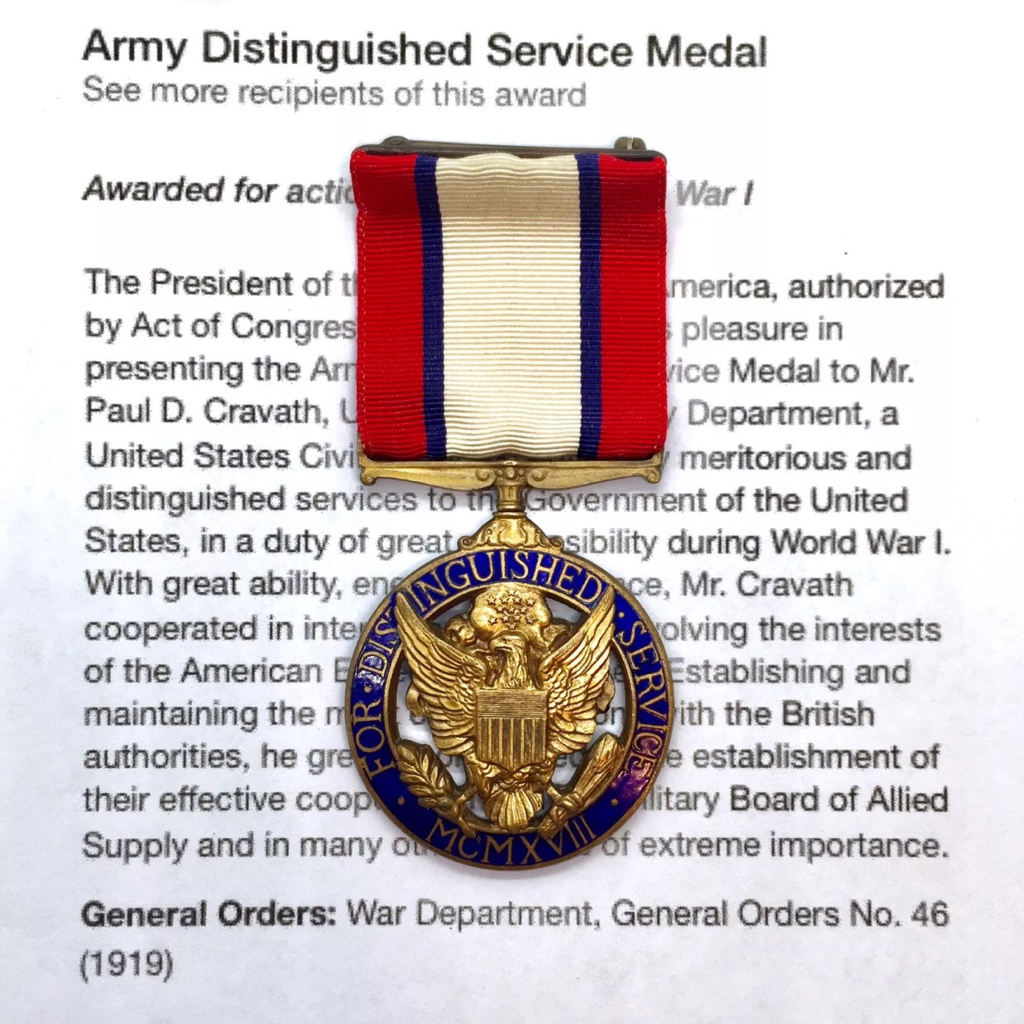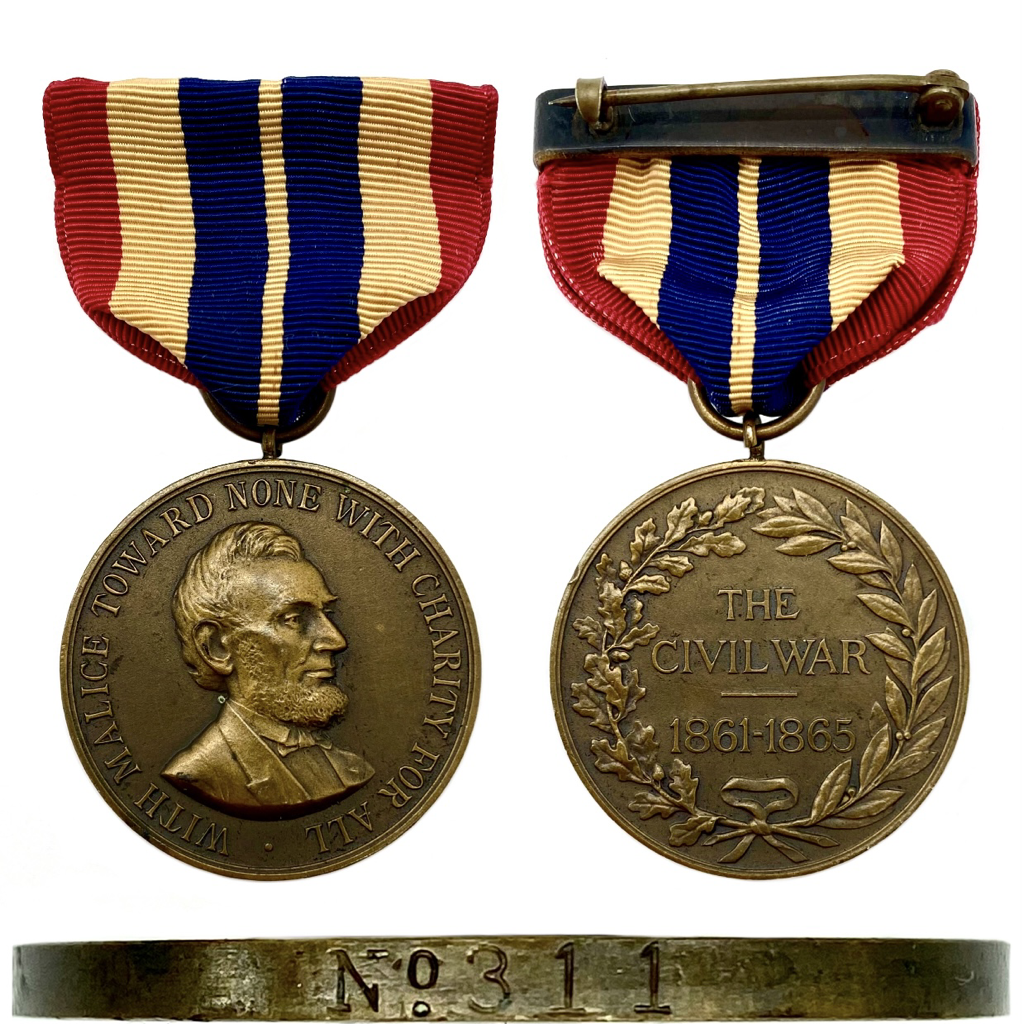1918 U.S. Mint Distinguished Service Medal
#1399
"Paul D. Cravath"
"Paul D. Cravath"
The President of the United States of America, authorized by Act of Congress, July 9, 1918, takes pleasure in presenting the Army Distinguished Service Medal to Mr. Paul D. Cravath, United States Treasury Department, a United States Civilian, for exceptionally meritorious and distinguished services to the Government of the United States, in a duty of great responsibility during World War I. With great ability, energy, and patience, Mr. Cravath cooperated in international matters involving the interests of the American Expeditionary Forces. Establishing and maintaining the most cordial relations with the British authorities, he greatly contributed to the establishment of their effective cooperation with the Military Board of Allied Supply and in many other matters of extreme importance.
General Orders: War Department, General Orders No. 46 (1919)
Paul Drennan Cravath Biography
(1861–1940), lawyer, cum laude, The Cravath Firm and Its Predecessors, 1819–1940
Born in Berlin Heights, Ohio, Cravath spent most of his childhood in Nashville, Tennessee, where his father was the first president of Fisk University. Later, he attended Brooklyn Polytechnic Institute and subsequently received his A.B. degree from Oberlin in 1882. Cravath pursued his ambition to become a lawyer by studying in a law office in Minneapolis and later became a salesman for an oil company, where after a year and a half, he had earned enough to be able to attend Columbia Law School. Although a less-than-stellar student in college, at Columbia Cravath ranked at the top of his class and received his LL.B. in 1886, cum laude. After receiving admission to the New York bar, Cravath began his practice as a clerk at Carter, Hornblower & Bryne. It was Walter Carter's practice of taking and training graduates with the best academic records from Columbia or Harvard that Cravath later incorporated into the "Cravath system." In 1899, at thirty-seven, Cravath joined Seward, Guthrie & Steele, the firm known today as Cravath, Swaine & Moore, as a partner. At the time Cravath joined the firm, like most other top firms, partners worked independently with their own clients and associates, and associates were not paid a salary but earned fees by developing their own clients. Cravath set out to make fundamental changes to the organization and structure of the firm, creating an institution that functioned with the efficiency of a business corporation. As the authoritative head of the firm until his death in 1940, he insisted that the firm hire only graduates with top academic records, that partners operate collectively in the firm's work, and that associates be paid a salary. Young associates were trained as generalists before specializing by watching senior attorneys break down a large problem into component parts and being given one of the small parts to handle thoroughly. Associate responsibilities were increased as soon as competency was demonstrated. With an "up or out" philosophy, Cravath believed that with few exceptions, no associate should be permitted to stay with the firm for more than six years unless admitted to the partnership. Cravath demanded a work ethic that results be achieved regardless of what was involved and how much inconvenience it might cause, even if it took all night. He had little patience for incompetence, inefficiency, and mediocrity. Adopting these approaches, Cravath systematically molded the firm into an entity that was competent, efficient, and completed work as nearly perfectly as possible. Other firms were quick to follow this system of organizing the law firm, and the Cravath system in most ways has endured today. In his law practice, Cravath dominated discussions with his driven personality, persuasiveness, and respect for the opinions of others. Though he rarely appeared in a courtroom, he was particularly adept at creating solutions to complex mixed business and legal problems. Cravath continued at the firm until his death in 1940, advising clients including Westinghouse, Royal Dutch-Shell, Goodyear Tire & Rubber, and General Motors. Cravath was one of the founders of the Council on Foreign Relations in 1919 and served as President of the Metropolitan Opera during a critical period for the company."
Paul Drennan Cravath Biography - (1861–1940), lawyer, cum laude, The Cravath Firm and Its Predecessors, 1819–1947
"NOTABLE NEW YORKERS"
Circa 1899
General Orders: War Department, General Orders No. 46 (1919)
Paul Drennan Cravath Biography
(1861–1940), lawyer, cum laude, The Cravath Firm and Its Predecessors, 1819–1940
Born in Berlin Heights, Ohio, Cravath spent most of his childhood in Nashville, Tennessee, where his father was the first president of Fisk University. Later, he attended Brooklyn Polytechnic Institute and subsequently received his A.B. degree from Oberlin in 1882. Cravath pursued his ambition to become a lawyer by studying in a law office in Minneapolis and later became a salesman for an oil company, where after a year and a half, he had earned enough to be able to attend Columbia Law School. Although a less-than-stellar student in college, at Columbia Cravath ranked at the top of his class and received his LL.B. in 1886, cum laude. After receiving admission to the New York bar, Cravath began his practice as a clerk at Carter, Hornblower & Bryne. It was Walter Carter's practice of taking and training graduates with the best academic records from Columbia or Harvard that Cravath later incorporated into the "Cravath system." In 1899, at thirty-seven, Cravath joined Seward, Guthrie & Steele, the firm known today as Cravath, Swaine & Moore, as a partner. At the time Cravath joined the firm, like most other top firms, partners worked independently with their own clients and associates, and associates were not paid a salary but earned fees by developing their own clients. Cravath set out to make fundamental changes to the organization and structure of the firm, creating an institution that functioned with the efficiency of a business corporation. As the authoritative head of the firm until his death in 1940, he insisted that the firm hire only graduates with top academic records, that partners operate collectively in the firm's work, and that associates be paid a salary. Young associates were trained as generalists before specializing by watching senior attorneys break down a large problem into component parts and being given one of the small parts to handle thoroughly. Associate responsibilities were increased as soon as competency was demonstrated. With an "up or out" philosophy, Cravath believed that with few exceptions, no associate should be permitted to stay with the firm for more than six years unless admitted to the partnership. Cravath demanded a work ethic that results be achieved regardless of what was involved and how much inconvenience it might cause, even if it took all night. He had little patience for incompetence, inefficiency, and mediocrity. Adopting these approaches, Cravath systematically molded the firm into an entity that was competent, efficient, and completed work as nearly perfectly as possible. Other firms were quick to follow this system of organizing the law firm, and the Cravath system in most ways has endured today. In his law practice, Cravath dominated discussions with his driven personality, persuasiveness, and respect for the opinions of others. Though he rarely appeared in a courtroom, he was particularly adept at creating solutions to complex mixed business and legal problems. Cravath continued at the firm until his death in 1940, advising clients including Westinghouse, Royal Dutch-Shell, Goodyear Tire & Rubber, and General Motors. Cravath was one of the founders of the Council on Foreign Relations in 1919 and served as President of the Metropolitan Opera during a critical period for the company."
Paul Drennan Cravath Biography - (1861–1940), lawyer, cum laude, The Cravath Firm and Its Predecessors, 1819–1947
"NOTABLE NEW YORKERS"
Circa 1899

































